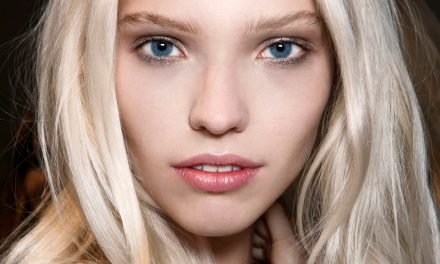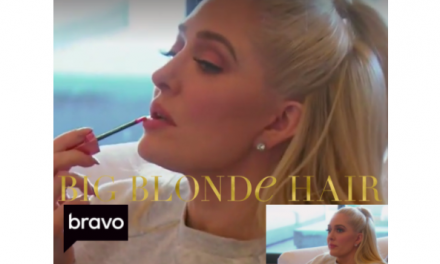
As a professional working makeup artist who’s specialized in women over the age of 50, I can honestly say that one of the most important things we can do to go from good to gorgeous is to wear makeup colors that will make our skin look radiant and wear eyeshadow colors that will make our eyes pop.
A few years ago, I was teaching a makeup techniques class for those of us over 50. A woman came up to me and whispered, “I hope you’ll talk about wearing the right colors because everyone around here wears beige.” And quite honestly, that wasn’t far from the truth!
Now some of us can look gorgeous in beige. Others, however, look washed out and lifeless instead – and I definitely fall into that latter category!
Did You Read the Book Color Me Beautiful?
Do any of you remember the book Color Me Beautiful from the 1980s? Carole Jackson did a really brilliant job categorizing certain types of colors by seasons.
I imagine some of you are smiling, remembering that you are a “winter,” “summer,” “spring” or “fall.” Many of us carried around swatches of fabrics or cards with colors printed on them to help us shop for the clothing colors that would be the most flattering for us.
Knowing the Color of Our Skin Undertone Is Key
So how do we know which clothing and makeup colors are the ones that will make us shine? It all comes down to the undertone of our skin. Though our skin tone may get lighter as we get older, the undertone never changes.
It’s based on how much of these three pigments we have in our skin: melanin (brown), carotene (yellow) and hemoglobin (red). Because our skin acts as a thin filter, it’s the tone just under the surface – our undertone – that determines whether we lean toward cool, warm or neutral.
Those with a cool undertone (the summer and winter seasons in the Color Me Beautiful book) have blue undertones and those with a warm or golden undertone fall under the umbrella of the autumn or spring seasons.
And if you have a neutral undertone – which is somewhere in between – you are quite fortunate, because you can wear some of the less intense colors from each season.
Answering These Nine Questions Can Help!
If you’re not sure of your undertone – or want to confirm it – let’s run through the nine questions we can ask to help determine the undertone of our skin. And, by the way, it’s helpful to cover up your hair when you look in the mirror to go through these questions. You will also need to remove your makeup.
What Is the Color of Your Veins?
To answer the first question, take a look at the veins on the underside of your wrist. Are the veins blue or green – or somewhere in between?
- Blue = cool undertone
- Green = warm
- Somewhere in between usually means neutral.
Now this may not be easy to determine, so let’s keep going.
Gold or Silver?
The second question is: which looks better on you, gold or silver jewelry? Cover up your hair and hold silver jewelry next to your face and then gold jewelry and then try to determine if there’s one color which looks better against your skin.
Silver jewelry works better with cool skin tones and gold is better with warm undertones. Those with neutral skin tones can wear both well.
Do You Tan or Burn?
The third question is really an important one: Do you tan or burn? Usually those of us with warm undertones will tan and those of us with cool undertones will burn. And if you burn and then tan, you may fall into that neutral category.
What Is Your Ear Undertone?
This fourth question is a little odd, but bear with me. Bend your ear forward. Does it look more pink (cool undertone), yellow (warm undertone) or neutral?
Be sure to check out Elise’s YouTube channel which specifically focuses on makeup tips, techniques, and product reviews for those of us 50+. Don’t forget to subscribe!
How About a Quick Visualization?
The next one, number five, is an interesting one. Close your eyes and visualize a bright fuchsia lipstick and a bright orange lipstick. You may dislike both colors, but chances are you’ll like one at least a little more than the other.
If you prefer fuchsia, you are more drawn to cool tones and most likely have a cool undertone. And in case you chose orange, you gravitate toward warm colors and, chances are, you have a warm undertone.
What’s in Your Closet?
For question number six, you’ll want to check in your closets to find some bright pink or yellow fabric. Bright gold and silver will also work. Then, cover your hair and take a moment to drape each of the fabrics around your shoulders so you just see your face and neck.
Which color makes your skin look brighter and more alive? If silver or fuchsia perks up your skin tone, you have a cool undertone. If bright yellow and gold look best, you have a warm undertone.
Which Neutral Colors Are Best?
Question number seven can often be especially helpful. Which neutral tones are most flattering to your skin? If bright white, black and grey look great on you, your undertone is cool. If you definitely look better wearing ivory or tan, you’re a warm undertone.
What Does a White Sheet of Paper Reveal?
The next question requires an 8 ½” x 11” sheet of white paper. Hold it next to your neck and the bottom part of your face when you’re not wearing makeup. What color do you see in your skin?
Are the undertones more yellow or pink? Yellow equals a warm undertone and pink signifies a cool undertone. And if you’re somewhere in between, most likely you have a neutral undertone.
What Colors Draw Compliments?
Finally, question number nine is probably the most important: what color top, blouse or scarf always draws compliments when you wear it?
If the color falls on the warm side of the color wheel (reds, corals, yellows, etc.), you most likely have a warm undertone. On the other hand, if the color is on the cool side of the color wheel (blues, blue-purples, etc.), you most likely have a cool undertone.
If you’re still unsure of your undertone (and this can certainly be the case for many of us), when it’s safe to do so, invite over several friends and go through the process together. Objective opinions can be helpful – andthe whole process can be really fun.
We Can Actually Wear Every Color, But Here’s What’s Important
There’s one important concept in the Color Me Beautiful book that I want to mention because I think it went a bit under the radar for many of us. It’s something the author said about shade and intensity of color.
She said, and I’m going to quote her here:
“You can wear almost any color; it’s the shade and intensity that counts. Spring colors are clear, delicate or bright with yellow undertones. Autumn’s colors are stronger with orange and gold undertones. Winter’s colors are clear, vivid or icy with blue undertones. And Summer’s colors are cool and soft with blue undertones.”
Let me give you an example. As a winter with a cool undertone to my skin, bright golden yellows do not work well for me (and that’s an understatement). But that doesn’t mean I can’t wear any yellow. What I can wear is an icy yellow – a yellow with a lot of white in it.
Which Makeup Colors Work Best for Us Based on Our Undertone?
Now let’s shift our focus to best colors for our makeup based on our skin undertone. If we have a cool undertone, the blush and lipstick colors that look best are cool pinks, berries, plums and blue-reds.
For warm undertones, the best colors are peaches, corals, tangerines, oranges and red-orange. It’s also important to know your skin undertone when you’re choosing a foundation shade.
Now for Our Eyes
Switching to our eyes, the most important eyeshadow color we can wear is a color that makes our own eye color more obvious so it really pops. For instance, blue eye shadow with blue eyes means that all the blue colors will blend together and the eyes won’t stand out.
What we want to do is go with the colors on the color wheel that are complementary – i.e., opposite – to our eye color.
About a year ago I did a YouTube video featuring a mini makeover with my friend Becky, who has gorgeous green eyes. When I suggested using a reddish brown color eyeshadow, she didn’t say anything, but later she told me she’d been extremely skeptical. But she loved the way her eyes looked.
The reason why this eyeshadow color really made her eyes stand out and look even more beautiful was because it was a complementary color to her eye color. So, choosing a complementary color – which is the color just opposite your eye color on the color wheel – is a really great choice.
If you go to the description box for the video above on my YouTube Channel, you’ll find a list of all the different eye colors and the eyeshadow colors that look the best with each eye color. The description box can be found by clicking on “Show More” under the video and on the left.
You may have noticed that complementary colors are usually opposite in terms of being warm or cool. So, one EASY way to remember what color combinations might look especially good is to combine a warm and cool color together.
For example, if I decided to wear neutral brown eyeshadow colors, I might want to add just a touch of light or medium orange to give a little more pop to the look. And by the way, neutral eyeshadow colors in beiges and browns will work well for all of us.
Have you read Carole Jackson’s Color Me Beautiful book? If so, did learning which colors looked best on you make a difference in your choice of clothing colors? How about your makeup colors? Do you get compliments when you wear a color that works well with your skin undertone?





